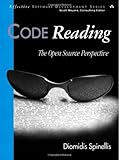Effective Java by Joshua Bloch has code snippets that are very well-written, as are the examples in The Go Programming Language by Donovan et. al. I read practically all the code in Effective Java, and a lot of the examples in The Go Programming Language (I keep dipping into this book every now and then as I have to learn some aspect of Go, which I use at work; I think I may actually sit down and read this book cover-to-cover and perhaps play with most of the examples).
If you know C, you may want to give the examples in The C Programming Language by Kernighan et. al a go. The examples are written in a bit of an archaic dialect but still very clear.
Another book of note that is funny and engaging (but of course not something that has professional value) is If Hemingway Wrote Code by Angus Croll: https://nostarch.com/hemingway. I think I have read all of the code in this book.
[1]: https://www.amazon.com/Code-Reading-Open-Source-Perspective/...
(Amazon says I bought it 14 years ago!)
http://www.amazon.com/Code-Reading-Open-Source-Perspective/d...
http://stackoverflow.com/questions/3883484/using-python-code...
Python has a very rich toolset, including inspect module,
http://stackoverflow.com/questions/1568544/given-a-python-cl...
http://code.activestate.com/recipes/213898-drawing-inheritan...
Also (this thread)[http://stackoverflow.com/questions/334009/how-to-read-source...] mentions ctags, doxygen, tools like that. Reading test suites (and running code coverage) is where a lot of people start with new to them codebases. And python specific emacs and vim plugins, and python-specific IDE's, komodo and pycharm, at the tools they provide for folding code, showing module dependencies/call graphs, stuff like that
---------
My python's a little rusty, but could generate stacktraces, or use an IDE's stepper/debugger to show where you are at some point in execution of django code
-----------
Finally [a book](http://www.amazon.com/Code-Reading-Open-Source-Perspective/d...)


https://github.com/redis/redis/tree/unstable/src
Entry point here at line 6816: https://github.com/redis/redis/blob/unstable/src/server.c
Also "Code Reading" will be useful. - https://www.amazon.com/Code-Reading-Open-Source-Perspective/...
"Code Reading" tends to be criticized, but I think mostly unfairly.